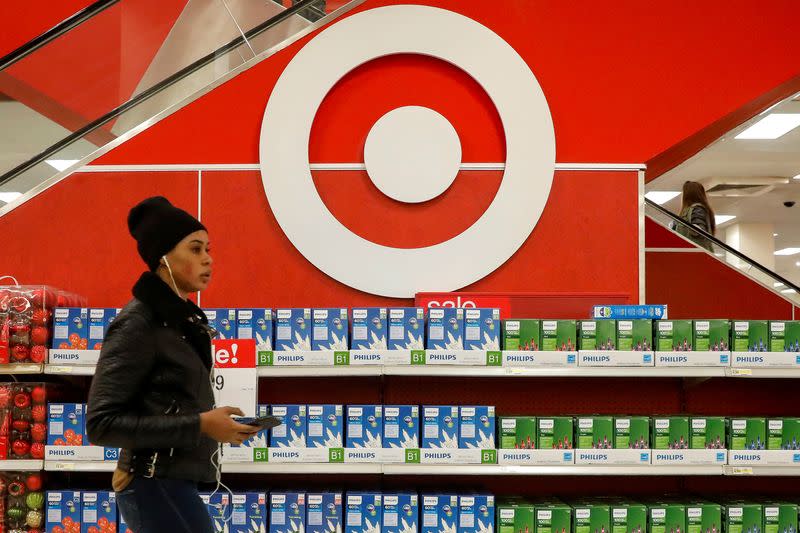Target issues weak forecast as shoppers pull back; shares tumble

By Siddharth Cavale and Ananya Mariam Rajesh
(Reuters) -U.S. retailer Target on Wednesday reported quarterly earnings that missed Wall Street estimates and its forecast for the current quarter also disappointed investors, who sold off its shares.
Last down 7.7% at $143.84, the stock was on track for its sharpest one-day drop since November 2022.
Last week, Target's larger rival Walmart reported better-than-expected results and raised its annual outlook as shoppers prioritized food and essentials like toilet paper and detergent.
"Target's performance is significantly worse than the overall market, which underlines that Target is losing [market] share," said Neil Saunders, managing director of research firm GlobalData. "All in all, the picture painted by today's figures is of a business that has run out of steam."
Target had a 1.8% share of U.S. retail sales in 2023, according to calculations by Kantar, a data and analytics firm. That was down from 2.1% in 2020, Kantar said.
"Yes, they are losing market share," said Charles Sizemore, chief investment officer of Sizemore Capital Management, which owns shares in Target. But Sizemore said it was "not accurate to compare" Target's results with those of Walmart, which is the biggest U.S. grocery retailer.
In the first quarter ended May 4, Target comparable sales fell 3.7%, the fourth straight quarterly decline. Comparable sales include sales of retail goods at stores and online but not sales of advertising.
Looking ahead, the retail chain forecast flat to 2% comparable sales growth in the second quarter. But the midpoint of that range, 1%, was below the 1.39% comparable sales growth that analysts previously forecast.
Shoppers are delaying purchases, waiting for deals, and increasingly spending on out-of-home activities, CEO Brian Cornell said on a media call. Chief Growth Officer Christina Hennington said she expects discretionary spending to remain pressured short-term but improve later this year.
Analysts and investors said Target had levers to pull to prop up its business and attributed its performance to both macroeconomic factors and internal challenges.
To grab more share of the consumer wallet that was going to rivals like Walmart, Target cut prices on 1,500 products and laid out plans to lower prices on 5,000 grocery items this summer including milk, fruit, diapers, pet food and products from its supplier Clorox . In April, Target launched Target Circle 360, offering unlimited same-day deliveries for $99 a year if subscribers meet a $35 basket minimum.
Christian Greiner, senior portfolio manager at F/m Investments which holds Target shares, said Target should have moved faster to slash prices and roll out its Target360 membership plan. "Target is really serving such a different number of people in the middle class," he said. "You have some struggling and some doing well."
Target said it was "laser-focused" on getting back to sales growth in the current quarter, banking much of its hopes on sales events planned for Memorial Day and the July 4th weekend as well as the price cuts.
Sales in what Target calls its frequency categories - Beauty, Food & Beverages and Household essentials - fell by low single digits in the first quarter.
The company maintained its full-year target, with comparable sales seen flat to up 2%, and earnings of $8.60 to $9.60 per share.
(Reporting by Siddharth Cavale in New York, Savyata Mishra and Ananya Mariam Rajesh in Bengaluru, Editing by Nick Zieminski and David Gregorio)